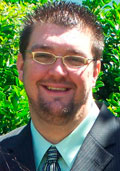“Big Russ and Me: Father and Son,” by Tim Russert.
“Faith of My Fathers,” by John McCain.
“Lessons Learned as the Son of a Serial Killer,” by Michael Sims.
While you may be familiar with parts of the first two stories, chances are you haven’t heard Michael Sims’s story. It isn’t a book, but his tale, which he shares with churches and groups, is as gripping as any bestseller.
 Michael Sims
Michael SimsMichael Sims is pastor of families and students at Oakwood Baptist Church in Lexington. His father, Mitchell Sims, is a convicted murderer awaiting execution at San Quentin State Prison.
The gulf between a father on death row and the son who grew to know him within the bleak confines of a maximum-security prison is vast, but not so vast that a mysterious, powerful God cannot build a bridge across it, the son says.
The lives of father and son are intricately interwoven, marked by both brokenness and hope. It is a tragic but redemptive journey that has brought them to this moment: While his father awaits lethal injection in California, Michael asserts with a confidence that would seem to belie a lifetime spent visiting a dad behind bars, “God provides for his children.”
Mitchell was convicted of murdering three people in 1985 while robbing pizza parlors in South Carolina and California. In September 1987, he was tried in California and sentenced to execution. He was extradited to South Carolina, where he was convicted of first-degree murder and also condemned to death.
It was while in prison in South Carolina in 1991 that Mitchell, watching a TV preacher on Easter Sunday morning, felt that “God was speaking to him,” his son recounts. Mitchell surrendered his life to Jesus Christ. Michael describes his father’s salvation experience as “the most genuine I’ve ever seen.”
While Mitchell remained in South Carolina for several years awaiting extradition to California, Michael and his two younger brothers and a sister came to know their father through telephone calls and periodic visits inside the prison’s family room.
Their mother, Theresa, decided to remain committed to her marriage. When her husband was imprisoned, she continued raising her children in the most stable manner she could. Money was tight, and sometimes the electricity was turned off, “but we were never cold, and we never once missed a meal,” Michael said.
He describes his mother as a hero for holding the family together. Theresa finished high school and enrolled in college classes. “My mom worked hard to provide, and God worked hard to provide,” said Michael. “We had a difficult life, but it taught us that family conquers a number of things, and that God provides for his children.”
Theresa joined Laurel Baptist Church in West Columbia and made sure her children went with her. “One of the reasons she got back in church was because she knew she needed help,” Michael said. “We were there every Sunday morning, Sunday night and Wednesday night.”
At Laurel, Michael and his brothers were looked after by men who “invested themselves in our lives.” Michael remembers one man in particular, Harvey Crosby, who invited Michael to his home on a regular basis. There, Michael would join hands and pray with Crosby’s wife and children at the supper table, watch TV and ride four-wheelers – normal activities, but opportunities through which Crosby “poured himself into my life,” Michael said.
Growing up with their dad in prison naturally meant life was a “little bit different” for Michael and his siblings. A poignant memory for Michael is of the annual parent-teacher conference at the beginning of every school year. Inevitably, at some point near the end of the meeting, Michael’s mom would send him out to wait in the hallway; that was when he knew his mother was telling the teacher about his dad.
Although Michael professes unconditional love for his father and is convinced of his dad’s salvation, he readily acknowledges the devastating echo of sin. “The choices my dad made affected the families of three innocent murdered people, plus his own children and his grandchildren. The choices we make may affect many people for generations to come.
“My father is genuinely sorry for his mistakes. He has said, so many times, that he hurts for the victims and their families.”
Michael said his father, after his conversion, wrote to the families of the victims to express his apologies, but “as you may imagine – (they) did not want to hear anything from him and would not respond.”
A few months ago, Michael’s father was extradited back to California, where he waits, second-in-line, for lethal injection. His date of death has not been set. A nonprofit group in California has offered financial assistance to the Sims family so they can travel to San Quentin every couple of months for visits. Michael hopes he and his wife and young daughter will be able to see his father by Christmas.
Michael was 3 years old when his father embarked on his killing spree. Today, nearly 23 years later, the son is now a father himself – and a minister. He gives credit to his dad, while incarcerated, for expressing love toward him and telling him that “God had a plan for my life, a purpose for my being here.”
As a minister, Michael implores parents to make their children their number one priority. “If you fail to tell your children you love them, you are damning them for the rest of their lives,” he said.
He also preaches the good news that “God offers forgiveness to anyone who is willing to receive it.”
“My dad has made mistakes that are a lot bigger than others. Despite what he’s done, God has a purpose for his life, his testimony, and his story. God used the tragic circumstances surrounding these crimes to bring a number of people to a saving relationship with him – including the murderer known as Mitchell Sims.”